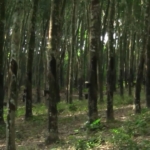
The Rubber Processors Association of Ghana (RUPAG) has lauded the government for announcing a decisive policy in the 2026 Budget to restrict the export of raw rubber (cuplumps), describing it as a “critical and timely intervention” to protect Ghana’s domestic rubber industry.
The budget, in paragraph 1028, confirmed that the restriction forms part of the Feed the Industry Programme, a national initiative aimed at ensuring the availability of raw materials for local factories.
According to RUPAG, the export of raw rubber has surged over the past decade peaking in the last four years diverting essential raw materials away from domestic processors. The association says the trend has weakened factory operations, caused job losses, undermined outgrower financing schemes, and resulted in significant foreign exchange leakages.
A Turning Point for the Sector
RUPAG described the new policy as evidence that government has heeded long-standing concerns raised by industry stakeholders. The association believes the decision marks a major step toward strengthening Ghana’s industrialisation and value-addition agenda.
“The restriction on the export of raw rubber is expected to boost industrial growth by securing raw material supply to domestic processors,” RUPAG said. “This will enable factories to operate at higher capacities and maximise the national benefits of value addition.”
Expected National Impact
The association outlined several benefits the policy could deliver: stabilised supply of raw materials for local processors, restoration of factory utilisation and protection of industry investments, support for repayment of over GHS650 million in outgrower loans and protection of more than 70,000 rural livelihoods in the rubber value chain
The rest are improved foreign exchange retention and increased tax revenue as well as support for the government’s industrial transformation and 24-Hour Economy agenda
RUPAG Commits to Expanded Production
To complement the policy, RUPAG says it will work with government to roll out a national programme to increase raw rubber production from the current 100,000 tons of dry rubber to 250,000 tons by 2035.
Key interventions under the programme include:
Expanding rubber plantations with subsidised high-yield planting materials (10,000 hectares annually)
Enhancing budwood gardens and nursery setups
Strengthening technical services for farmers
Improving extension support across rubber-growing areas
Promoting sustainable farm management practices
Increasing farmer incomes through carbon credit initiatives and EUDR compliance premiums
RUPAG believes these measures will secure long-term raw material availability, improve farmer livelihoods and position Ghana as a competitive global rubber producer.
Looking Ahead
The association reiterated its readiness to collaborate with government and other stakeholders to ensure effective implementation of the policy.
RUPAG concluded by praising the government for what it described as a “historic, forward-looking decision” that strengthens national economic resilience and anchors the future of Ghana’s rubber industry.